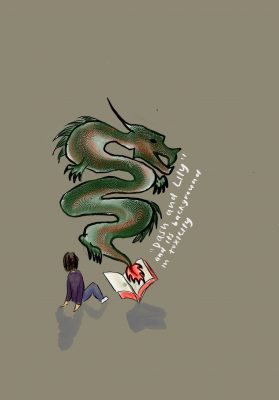“Dash and Lily” is a new Netflix Christmas show about a romance that takes place through a red notebook of dares. The show remakes Rachel Cohn and David Levithan’s novel “Dash and Lily’s Book of Dares” into a romantic comedy featuring two pairs of terrible parents.

A quick summary of the plot: main characters Dash and Lily are high school-aged kids living in New York City. They communicate by writing dares for each other in a red notebook. What brings the two together, despite their opposing personalities, is their shared loneliness.
Another commonality between the two is their dysfunctional relationships with their parental figures. At first, only Dash’s relationship with his parents is visibly problematic — his mom and dad are divorced and unwilling to talk to each other, so he tricks them both into thinking he is spending the holidays with the other. His end goal is to be alone on the holidays. By doing so, Dash is able to express himself and be free while avoiding immediate punishment for his actions.
Dash’s father does not lash out when he finds out his son has been staying at his place over the holidays. Despite his irresponsible behavior that led his minor son to live alone in the city, Dash’s dad is still a better parent than Lily’s distrustful and draconian parents.
When Lily’s family returns from a trip, they are revealed to be much more problematic than audiences imagined.

At one point, Dash dares Lily to go clubbing. She returns at 4 a.m. after her grandfather returns unexpectedly early from Florida.
As punishment for her “digression,” her grandfather grounds her indefinitely, without any leniency. By grounding her, he severs Lily’s independence and breaks any trust they had established. Essentially, he takes away the freedom teenagers need in order to learn and grow.
The lack of trust ultimately stems from a lack of communication. Communication is vital in familial relationships — especially when a teenager like Lily tries to push herself out of her comfort zone but is instead punished.
Parent-child relationships on screen should depict more leniency when it comes to parental control. By showing a toxic relationship, Netflix sets a bad example for parents and children in the modern world.
It is natural for teenagers to want to push the bounds of their freedom, and normalizing drastic punishments only sets a negative example for children trying to become their own people.
Neither Lily’s parents nor grandparents actively trust her. Once her parents get home, they reveal their Fiji honeymoon was actually a chance to scope out her dad’s job offer. Because, no, Lily’s parents didn’t trust her with the fact that her dad lost his job and they were about to move to another country — she was given less than a week’s notice to pack up her life.
Had they actively communicated with each other, there would have been less drama and complications. Trust is essential for healthy parent-child relationships.
It should be noted I am not trying to give any sort of parental advice. I am not a parent and am in no position to become one. However, I am a child and am advocating for something that worked for me and my parents. It’s quite clear Lily’s relationship with her parents is fundamentally flawed because there was no trust to back it.
Lily ultimately ends up staying with her grandfather in New York City instead of going with her parents to Fiji. I am not sure which choice would have been better.
Would it be better to stay with a grandparent who doesn’t trust her but still possesses a modicum of respect for her? Or should she have gone to Fiji with parents who lied to her and fundamentally did not respect her decisions?
Depicting a dysfunctional household detracts from the holiday message the show is trying to peddle.
One could claim this dysfunction makes “Dash and Lily” more interesting, but I disagree. Throughout the show, the flaws in Lily’s family serve as nothing more than a forced plot point to create conflict.
The lack of trust provides an unnecessary background of toxicity, adding nothing to the plot nor Lily’s character development. The only thing it successfully does is promote unhealthy familial relationships.




